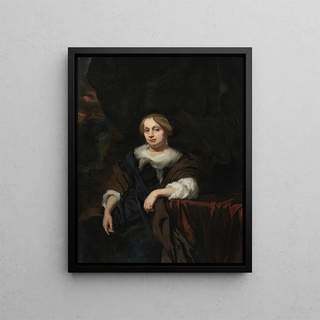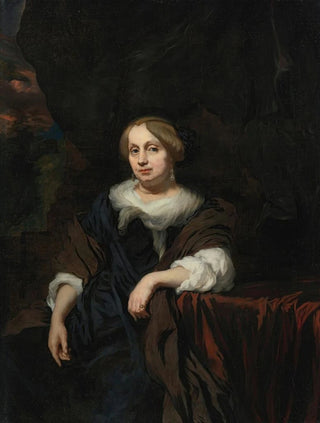Taidetuloste | Portrait d'une dame (conflit de cas) - Nicolaes Maes


Takaa näkyvä näkymä

Kehys (valinnainen)
Reproduction Portrait of a Lady (case conflict) - Nicolaes Maes – Engaging introduction
In the fascinating world of 17th-century painting, Nicolaes Maes' "Portrait of a Lady (case conflict)" stands out for its elegance and psychological depth. This artwork, embodying the refinement of Dutch art, immerses us in a world where the portrait becomes not only a reflection of outer beauty but also a mirror of the soul. The composition, rich in detail and emotion, invites us to question the identity of this mysterious lady while revealing the subtleties of social life of the time. Through this painting, Maes manages to capture the present moment while hinting at a story, a lived life, making it a centerpiece of portrait painting.
Style and uniqueness of the work
Nicolaes Maes' style is characterized by an impressive mastery of light and shadow, an essential element of chiaroscuro that brings his characters to life. In "Portrait of a lady (case conflict)", the light seems to caress the woman's face, accentuating the softness of her features and the richness of her costume. The textures of the fabrics, finely rendered, testify to exceptional craftsmanship, while the color palette, subtly chosen, evokes both softness and sophistication. The posture of the lady, both graceful and dignified, suggests a certain introspection, as if she were aware of the gaze upon her. This work does not merely depict a female figure; it immerses us in an atmosphere where intimacy and mystery intertwine.
The artist and his influence
Nicolaes Maes, a pupil of Rembrandt, developed a style that is uniquely his own while incorporating the teachings of his master. His artistic journey is marked by an evolution from dramatic chiaroscuro to a softer, more intimate approach. Maes captured the essence of Dutch bourgeoisie through his portraits, while also showing interest in genre scenes that highlight everyday life. His influence extends well beyond his era, inspiring many artists who followed his path.

Rendu mat

Takaa näkyvä näkymä

Kehys (valinnainen)
Reproduction Portrait of a Lady (case conflict) - Nicolaes Maes – Engaging introduction
In the fascinating world of 17th-century painting, Nicolaes Maes' "Portrait of a Lady (case conflict)" stands out for its elegance and psychological depth. This artwork, embodying the refinement of Dutch art, immerses us in a world where the portrait becomes not only a reflection of outer beauty but also a mirror of the soul. The composition, rich in detail and emotion, invites us to question the identity of this mysterious lady while revealing the subtleties of social life of the time. Through this painting, Maes manages to capture the present moment while hinting at a story, a lived life, making it a centerpiece of portrait painting.
Style and uniqueness of the work
Nicolaes Maes' style is characterized by an impressive mastery of light and shadow, an essential element of chiaroscuro that brings his characters to life. In "Portrait of a lady (case conflict)", the light seems to caress the woman's face, accentuating the softness of her features and the richness of her costume. The textures of the fabrics, finely rendered, testify to exceptional craftsmanship, while the color palette, subtly chosen, evokes both softness and sophistication. The posture of the lady, both graceful and dignified, suggests a certain introspection, as if she were aware of the gaze upon her. This work does not merely depict a female figure; it immerses us in an atmosphere where intimacy and mystery intertwine.
The artist and his influence
Nicolaes Maes, a pupil of Rembrandt, developed a style that is uniquely his own while incorporating the teachings of his master. His artistic journey is marked by an evolution from dramatic chiaroscuro to a softer, more intimate approach. Maes captured the essence of Dutch bourgeoisie through his portraits, while also showing interest in genre scenes that highlight everyday life. His influence extends well beyond his era, inspiring many artists who followed his path.






